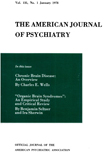Psychological Factors in Alcoholic Women
Abstract
We have presented data on 69 female alcoholics who have had three or more interviews. Almost all are of high socioeconomic status. The majority are Protestant and college-educated. They drink at home and do not come to the attention of public agencies.
Their childhoods were invariably disturbed, with a dependent relationship toward a cold, dominant parent, usually the mother. Half the fathers were alcoholic. Many patients felt an identification with the father rather than the mother. All patients grew up feeling inadequate and worthless and unable to express their hostility directly.
Marital disharmony appeared to be the most frequent factor perpetuating our patient's alcoholism, though many had drunk heavily before marriage. The marriages were troubled by inadequate emotional communication and poor sexual adjustment. Nevertheless, they were remarkably long-lasting and free of infidelity. The husbands were usually overtly domineering but invariably controlling and unable to express feelings. Patients who remained single had retained the ambivalent dependent relationship toward one or both parents.
Alcohol, initially the "enabling drug" which provided the missing feelings of adequacy and acceptability, became later the releaser of hostility, tool of revenge, and means of self-punishment. All patients exploded their anger when drunk.
The following modal pattern appeared in 27 of our cases: cold domineering mother, warmer but alcoholic father, "miserable self-image," cold domineering husband, resort to alcohol patterned after father's drinking.
We have speculated on what basic factors may be crucial to the development of alcoholism in an individual woman.
Access content
To read the fulltext, please use one of the options below to sign in or purchase access.- Personal login
- Institutional Login
- Sign in via OpenAthens
- Register for access
-
Please login/register if you wish to pair your device and check access availability.
Not a subscriber?
PsychiatryOnline subscription options offer access to the DSM-5 library, books, journals, CME, and patient resources. This all-in-one virtual library provides psychiatrists and mental health professionals with key resources for diagnosis, treatment, research, and professional development.
Need more help? PsychiatryOnline Customer Service may be reached by emailing [email protected] or by calling 800-368-5777 (in the U.S.) or 703-907-7322 (outside the U.S.).



